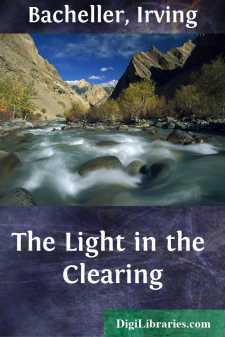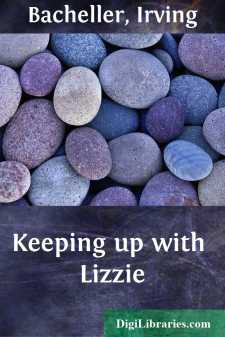Categories
- Antiques & Collectibles 13
- Architecture 36
- Art 48
- Bibles 22
- Biography & Autobiography 813
- Body, Mind & Spirit 141
- Business & Economics 28
- Children's Books 12
- Children's Fiction 9
- Computers 4
- Cooking 94
- Crafts & Hobbies 4
- Drama 346
- Education 46
- Family & Relationships 57
- Fiction 11826
- Games 19
- Gardening 17
- Health & Fitness 34
- History 1377
- House & Home 1
- Humor 147
- Juvenile Fiction 1873
- Juvenile Nonfiction 202
- Language Arts & Disciplines 88
- Law 16
- Literary Collections 686
- Literary Criticism 179
- Mathematics 13
- Medical 41
- Music 40
- Nature 179
- Non-Classifiable 1768
- Performing Arts 7
- Periodicals 1453
- Philosophy 64
- Photography 2
- Poetry 896
- Political Science 203
- Psychology 42
- Reference 154
- Religion 513
- Science 126
- Self-Help 83
- Social Science 81
- Sports & Recreation 34
- Study Aids 3
- Technology & Engineering 59
- Transportation 23
- Travel 463
- True Crime 29
Irving Bacheller
Irving Bacheller (1859-1950) was an American journalist and writer, best known for his novel "Eben Holden," which became a bestseller in 1900 and contributed to the rise of regional literature in America. He founded the first modern newspaper syndicate, which played a significant role in popularizing works by writers like Stephen Crane and Joseph Conrad. Bacheller's writing often depicted rural American life, and he was celebrated for his authentic portrayal of the culture and dialects of the Adirondack region.
Author's Books:
Sort by:
by:
Irving Bacheller
CHAPTER 1 Rome had passed the summits and stood looking into the dark valley of fourteen hundred years. Behind her the graves of Caesar and Sallust and Cicero and Catullus and Vergil and Horace; before her centuries of madness and treading down; round about her a multitude sickening of luxury, their houses filled with spoil, their mouths with folly, their souls with discontent; above her only mystery...
more...
by:
Irving Bacheller
CHAPTER I Near the end of my fourteenth year I was apprenticed to Valentine, King & Co., cotton importers, Liverpool, as a "pair of legs." My father had died suddenly, leaving me and his property in the possession of my stepmother and my guardian. It was in deference to their urgent advice that I left my home in London (with little reluctance, since my life there had never been happy) to...
more...
by:
Irving Bacheller
CHAPTER I THE MELON HARVEST Once upon a time I owned a watermelon. I say once because I never did it again. When I got through owning that melon I never wanted another. The time was 1831; I was a boy of seven and the melon was the first of all my harvests. Every night and morning I watered and felt and surveyed my watermelon. My pride grew with the melon and, by and by, my uncle tried to express the...
more...
by:
Irving Bacheller
KEEPING UP WITH LIZZIE IN WHICH THE LEADING TRADESMEN OF POINTVIEW BECOME A BOARD OF ASSESSORS The Honorable Socrates Potter was the only "scientific man" in the village of Pointview, Connecticut. In every point of manhood he was far ahead of his neighbors. In a way he had outstripped himself, for, while his ideas were highly modern, he clung to the dress and manners that prevailed in his...
more...
by:
Irving Bacheller
CHAPTER I THE HORSE VALLEY ADVENTURE "The first time I saw the boy, Jack Irons, he was about nine years old. I was in Sir William Johnson's camp of magnificent Mohawk warriors at Albany. Jack was so active and successful in the games, between the red boys and the white, that the Indians called him 'Boiling Water.' His laugh and tireless spirit reminded me of a mountain brook. There...
more...
by:
Irving Bacheller
PREFACE Early in the last century the hardy wood-choppers began to come west, out of Vermont. They founded their homes in the Adirondack wildernesses and cleared their rough acres with the axe and the charcoal pit. After years of toil in a rigorous climate they left their sons little besides a stumpy farm and a coon-skin overcoat. Far from the centres of life their amusements, their humours, their...
more...
by:
Irving Bacheller
I The Story of the Little Red Sleigh It was in 1835, about mid-winter, when Brier Dale was a narrow clearing, and the horizon well up in the sky and to anywhere a day's journey. Down by the shore of the pond, there, Allen built his house. To-day, under thickets of tansy, one may see the rotting logs, and there are hollyhocks and catnip in the old garden. He was from Middlebury, they say, and came...
more...
by:
Irving Bacheller
D'RI AND I I A poet may be a good companion, but, so far as I know, he is ever the worst of fathers. Even as grandfather he is too near, for one poet can lay a streak of poverty over three generations. Doubt not I know whereof I speak, dear reader, for my mother's father was a poet—a French poet, too, whose lines had crossed the Atlantic long before that summer of 1770 when he came to...
more...
by:
Irving Bacheller
IN WHICH HARRY SWIFTLY PASSES FROM ONE STAGE OF HIS CAREER TO ANOTHER “Harry and I were waiting for his motor-car,” said the Honorable Socrates Potter. “He couldn’t stand and wait––that would be losing time––so we kept busy. Went into the stores and bought things––violets, candy, golf-balls, tennis-shoes, new gloves, and neckties. Harry didn’t need ’em, but he couldn’t waste...
more...










